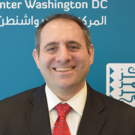Speakers

Intissar Fakir
Fellow and Editor in Chief of Sada, Middle East Program
Carnegie Endowment for International Peace

Allison L. McManus
Research Director
The Freedom Initiative

Stephen Zunes
Professor of Politics and International Studies
University of San Francisco
Moderator
Event Summary
On December 17, 2020, Arab Center Washington DC (ACW) hosted a webinar titled “Morocco-Israel Normalization: Implications for International Law, Regional Peace, and US Policy.” Panelists were Intissar Fakir, Fellow at the Carnegie Endowment for International Peace and Editor-in-Chief of Sada, Allison McManus, Research Fellow with the Freedom Initiative, Stephen Zunes, Professor of Politics and International Studies at the University of San Francisco, and Yousef Munayyer, ACW nonresident Senior Fellow. Tamara Kharroub, ACW Assistant Executive Director and Senior Research Fellow moderated the session.
Fakir began her presentation by highlighting Morocco’s perspective on the issue of the Western Sahara, saying that it is a crucial consideration for the Moroccan state and the country’s population. She stated that the American recognition of Morocco’s sovereignty over the area provided the kingdom with an important foreign policy victory that it has been denied for decades. She said that Morocco has so far failed to enlist the support of European countries and US President Donald Trump’s decision was a “most prized recognition.” To Moroccans, Fakir stated that Moroccans see the Western Sahara is national territory not occupied land. She also said that former National Security Advisor John Bolton was instrumental in delaying the White House’s latest step because he wanted Morocco to administer the United Nations-supported referendum over the fate of the territory. She said that Trump’s decision puts the entire western world in a tough position. The incoming Biden Administration will find itself in a very difficult situation in the future because it needs to balance its relations with a traditional ally, Morocco, with its declared emphasis on human rights and self-determination. Commenting on Algeria’s position, Fakir doubted that it will act quickly or irrationally, preferring to see how the issue develops in the future.
McManus addressed the issue of human rights in the Western Sahara region as well as in Morocco itself, saying that there have been serious violations of the freedoms of speech, expression, and assembly. She said that the narrative about the region is tightly controlled, both in the territory as well as in Morocco itself. McManus stated that in addition to getting a promise of a $1 billion arms deal from the United States, the Trump Administration’s recognition of Morocco’s sovereignty over the Western Sahara emboldens the kingdom’s security apparatus to increase these violations. One thing is sure, though; not much is known about the Sahrawi public’s sentiments about the future and how they really stand on the referendum that the United Nations is supposed to conduct there. McManus stated that the coronavirus pandemic is wreaking havoc in Western Sahara and the people are not getting much help from Morocco. Instead, they rely as much as they can on whatever assistance Algeria can provide. She agreed with Fakir that the Biden Administration will be in a very difficult position when it takes office because its emphasis on respect for human rights and adherence to international law will clash with the current administration’s recognition of Morocco’s sovereignty over the area.
Zunes emphasized the issues of international law and order in his remarks. He said that Trump’s proclamation on the Western Sahara was in obvious violation of international law and norms and will affect other issues like the Israeli occupation of Palestinian territories. Zunes likened the decision on the Western Sahara to that on the occupied Syrian Golan Heights. What also worries Zunes is the fact that the Western Sahara, as represented by the Polisario Front, is a member of the African Union and is recognized by some 80 countries around the world. That recognition is enshrined, he said, in the United Nations charter that the United States itself has time and again used to justify its own policies, such as the war on Iraq. Zunes said that the Sahrawi people are not Moroccan; they have their own culture, language and dialect, social conditions, and national identity. In fact, Sahrawi women’s conditions are better than Morocco’s. He said that the Western Sahara issue is one of self-determination and the Sahrawis must be allowed to decide their own future. On the other hand, Zunes discounted the efficacy of armed struggle for liberation. Instead, as was the case with East Timor’s independence from and Indonesia, the involvement of international civil society is the only way to help the Sahrawis achieve their national independence.
Munayyer also linked the Morocco-Israel normalization issue to Israel’s occupation of Palestinian lands and its position in the Middle East. He said that the normalization agreement with Morocco indicates that the Arab states are seeing a small window of opportunity with Donald Trump in the White House and they want to exploit it. They believe that they can get whatever they want from Trump before Biden comes in and imposes an institutional process for relations with states. Munayyer also said that some Arab states are witnessing the demise of any peace process with Israel and believe that it would be good to be on good terms with powerful actors in the region, in this case Israel. In that vein, Munayyer believes that there is a good possibility that there will be other Arab normalizers. However, he emphasized the importance of Morocco’s normalization and said that it is probably the most logical because about a million Jews in Israel have a Moroccan heritage and the ties between the two countries are real, unlike those with the UAE and Bahrain. To be sure, he stated, this normalization agreement hurts the Palestinians more than any other agreement. But he still criticized it because it enshrines Israeli occupation of Palestinian lands and legalizes the principle of “might is right.” As for the Biden Administration, Munayyer did not see it having much room to maneuver on the Palestinian-Israeli issue.
*Photo credit: Agence Marocaine de Presse


